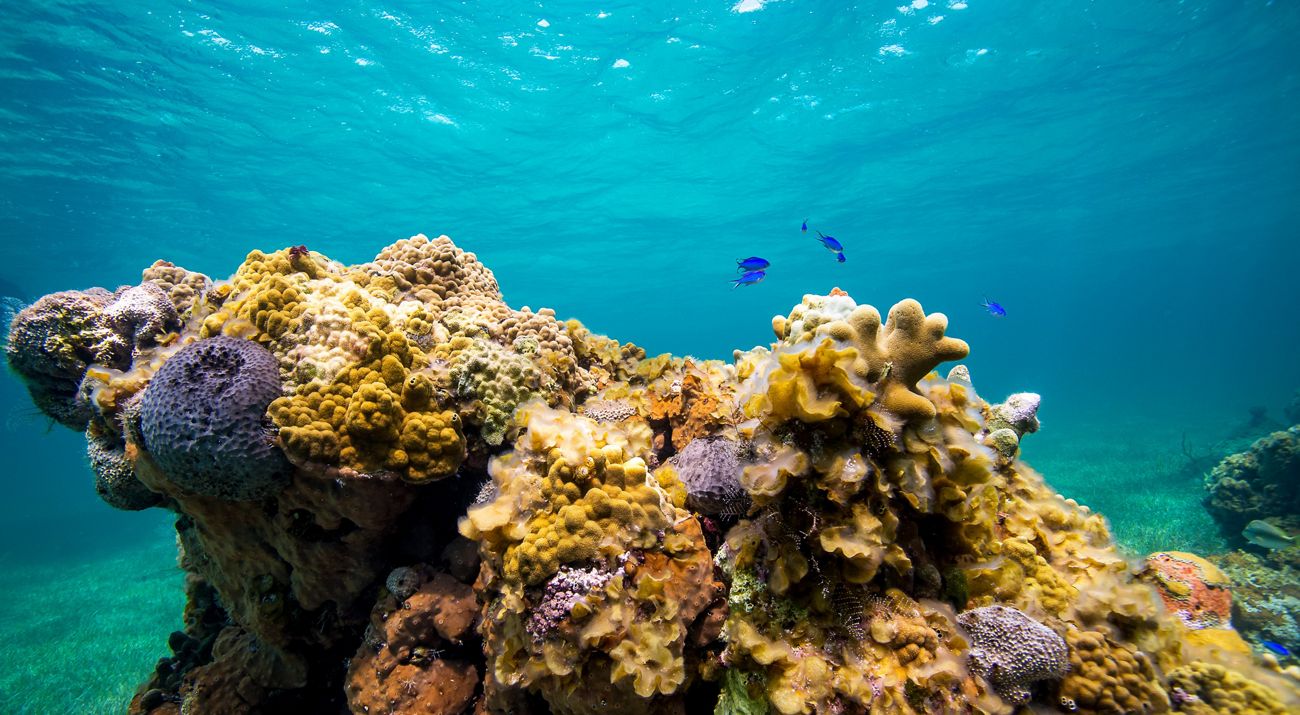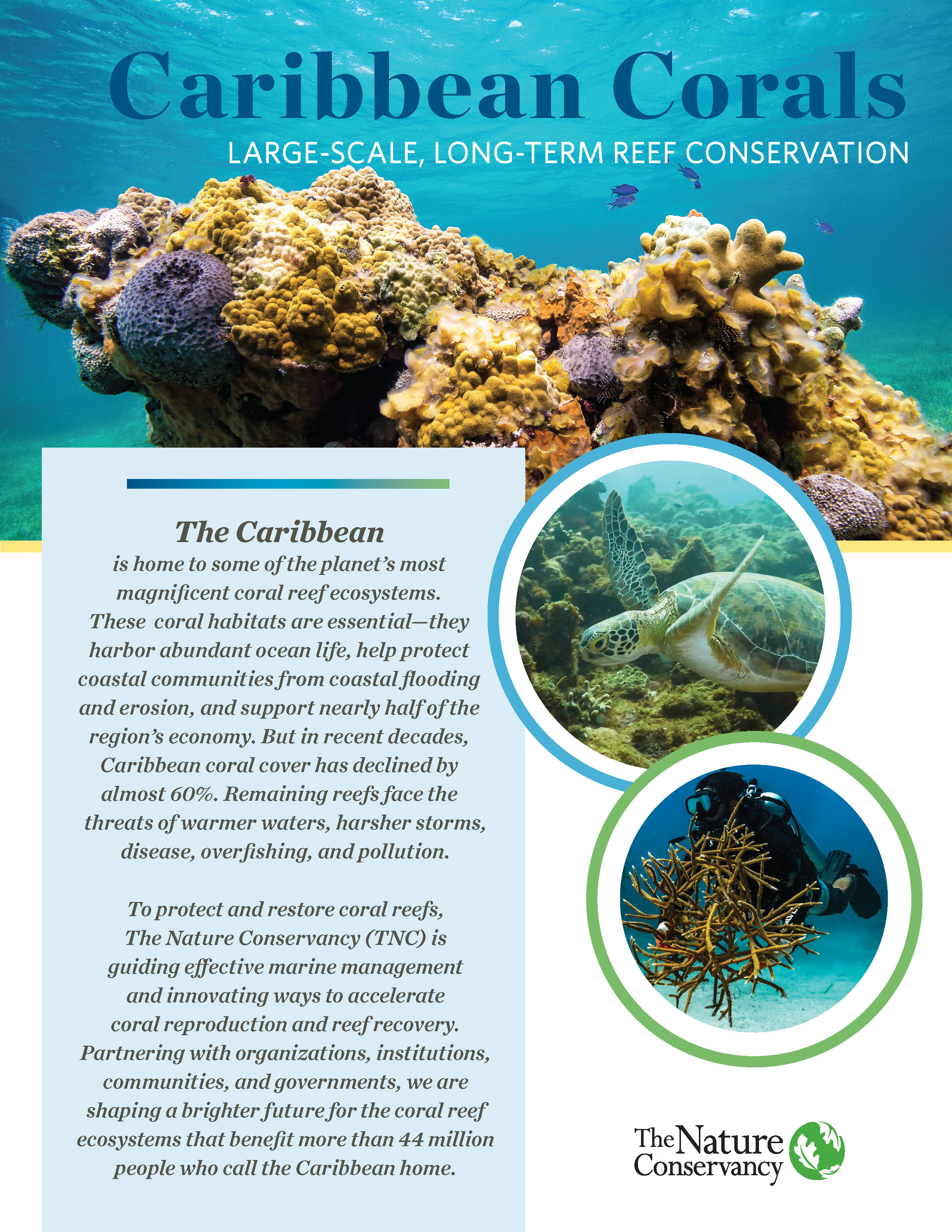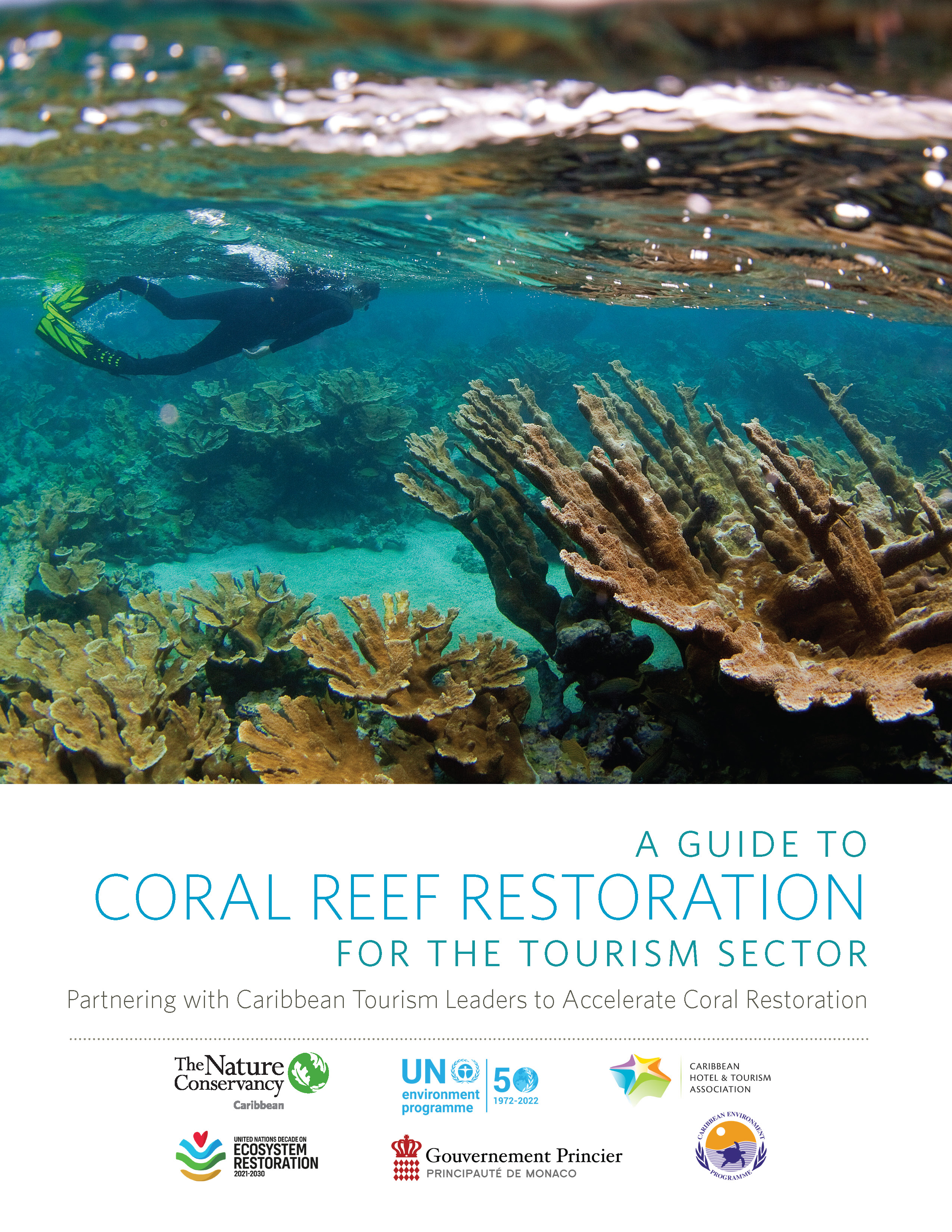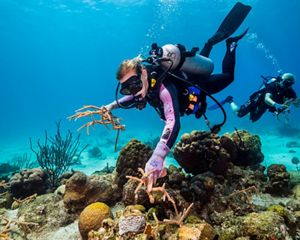
New Hope for Coral Reefs
With local partners and communities, we're advancing coral science and promoting sustainable ocean use to help our reefs before it's too late.
The Caribbean is home to some of the planet’s most magnificent coral reefs. These essential habitats help sustain life underwater and on land. They harbor abundant ocean life, protect communities from coastal flooding and erosion, and support nearly half of the region’s economy—particularly the fishing and tourism sectors, which are the driving economic forces in the Caribbean. But in recent decades, coral cover throughout the region has declined by almost 60 percent. Remaining reefs are threatened by warmer waters, harsher storms, disease, overfishing and pollution.
To protect and restore coral reefs, TNC is guiding effective marine management and innovating ways to accelerate coral reproduction and reef recovery. Our multifaceted approach aims to restore the long-term health of coral reefs, increase their resilience to a changing climate and address the threats that have caused their deterioration. Partnering with organizations, institutions, communities, and governments, we are shaping a brighter future for these vital ecosystems that benefit more than 44 million people across the Caribbean.
Our Coral Innovation Hubs
To scale up coral reproduction and restoration, we launched Coral Innovation Hubs in The Bahamas, the Dominican Republic and the U.S. Virgin Islands. Through state-of-the-art lab facilities and extensive coral nurseries at these Hubs, we’re developing techniques to breed significantly more corals for restoration, with greater survival rates. These techniques include larval propagation, which helps preserve coral genetic diversity and resilience, and microfragmentation, a process that dramatically stimulates coral growth.
Our newest Hub on St. Croix, U.S. Virgin Islands, is spearheading one of the world’s largest coral restoration initiatives, covering more than 150 acres of reef area in the East End Marine Park. In The Bahamas, working with partners that include the Cape Eleuthera Institute and Perry Institute for Marine Science, we developed techniques to increase the survival rates of young corals once they are released into the ocean or settled onto reefs. In the Dominican Republic, we work with Grupo Puntacana Foundation, Dominican Foundation of Marine Studies and the Dominican Reef Network to grow millions of new corals, representing many reef-building and endangered species.
At all our Coral Innovation Hubs, we raise awareness about the importance of coral reefs with students, communities and governments. We amplify the impact of our findings through the TNC-led Reef Resilience Network, an educational platform that connects 34,000 practitioners working to conserve coral reefs around the world. These efforts are catalyzing world-class science and a global network of partners to save imperiled reefs.

Mapping the Way to Healthier Coral Reefs
TNC and partners produced the first-ever high-resolution maps pinpointing the precise location of nearshore habitats throughout the Caribbean basin—a feat that provides unprecedented insights into coral reefs and other underwater oases of life. The maps, based on satellite and drone imagery, cover nearly 1 million square miles of ocean and can help transform marine and coral reef conservation efforts throughout the region.
We also created the first maps that show how coral reefs across the Caribbean will withstand the growing impacts of climate change, such as warmer waters and severe storms. These breakthrough maps reveal vital information for governments, marine managers, scientists, and practitioners—helping them to ensure greater long-term impact by prioritizing conservation efforts where reefs naturally have a higher probability of remaining healthy in the face of climate change. Already, these maps are helping us guide effective ocean management, prioritize coral conservation sites and design optimal reef restoration plans.
resilient coral reefs means safer communities
With 70 percent of its population living in coastal flood zones, the Caribbean is one of the world’s most vulnerable regions to climate change. More frequent and intense storms, including hurricanes, are a particularly dangerous impact of climate change. Healthy coral reefs absorb an average of 97% of the energy of incoming waves, helping to protect shoreline communities during severe storms.
TNC and the International Federation of Red Cross and Red Crescent Societies forged a first-of-its-kind partnership that bridges conservation and humanitarian efforts. Together, we invest in nature-based coastal resilience solutions, working with communities in the Dominican Republic, Grenada, Jamaica, and The Bahamas to implement climate preparedness initiatives that include the restoration of coral reefs and other nearshore habitats. In addition to restoring natural reefs, we are piloting hybrid "reefs"—structures made of both natural and artificial elements that help protect coastlines and provide new places for corals to take hold. We are also working to improve fishery sustainability and to mitigate sources of pollution that weaken coral reefs.
It is urgent that we scale coral recovery efforts across the Caribbean before it is too late. We are working with diverse partners to take action for coral reefs—from groundbreaking science pioneered at our Coral Innovation Hubs to cutting-edge mapping technologies to community-based resilience initiatives. Together, these efforts can conserve coral reefs at a scale that matters for our ocean and the lives and livelihoods that depend on it every day.
-

Charting a Course to Healthier Coral Reefs
Program Overview
Read about the cutting-edge techniques and technologies we're using to protect and restore these vital ecosystems throughout the Caribbean.
Download -

How Can Tourism Help Corals Reefs?
Research and Guidelines
A TNC-led study in the Caribbean identified key opportunities for the tourism sector to help reverse coral reef decline. Learn how this work can support both tourism and our ocean during a critical economic time.
Download


